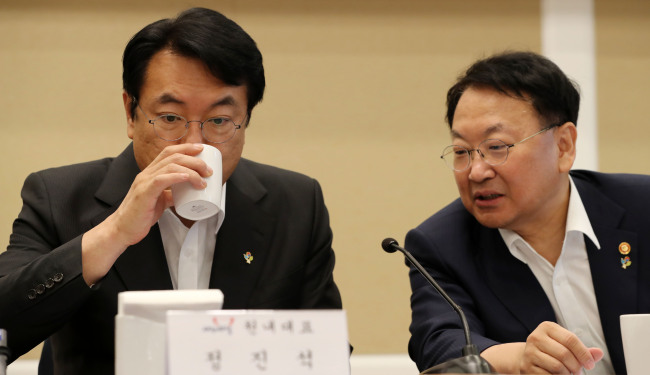South Korea‘s inconsistent fiscal policy draws criticism
By Korea HeraldPublished : June 27, 2016 - 15:10
[THE INVESTOR] The government is expected to unveil a plan to set aside about 10 trillion won ($8.4 billion) in supplementary budget Tuesday when it announces economic policy directions for the second half of this year.
In a meeting with lawmakers from the ruling Saenuri Party on Friday, Finance Minister Yoo Il-ho said he would actively consider drawing up an extra budget if it was to pass parliament within the next month.
Two days earlier, Yoo, who doubles as deputy prime minister for economic affairs, pledged to provide “sufficient” fiscal reinforcement to prop up the sluggish economy.
In a meeting with lawmakers from the ruling Saenuri Party on Friday, Finance Minister Yoo Il-ho said he would actively consider drawing up an extra budget if it was to pass parliament within the next month.
Two days earlier, Yoo, who doubles as deputy prime minister for economic affairs, pledged to provide “sufficient” fiscal reinforcement to prop up the sluggish economy.

“We are facing severe danger as economic conditions will likely worsen further in the second half of the year. The government has to move more aggressively to deal with it,” he said in an economy-related ministers’ meeting.
Calls for a supplementary budget has been rising as Asia’s fourth-largest economy is grappling with decreasing exports and slumping domestic demand, while pushing for corporate restructuring that will result in massive layoffs.
The fallout from the U.K. vote last week to leave the European Union is also seen to further complicate the tough economic environment facing Korea.
Government policymakers last week suggested the growth target for this year would be revised down to 2.8 percent from 3.1 percent.
Yoo’s positive stance on the need for fiscal stimulus marks an abrupt turn from his previous objection to drawing up a supplementary budget to bolster the slumping economy.
His initial emphasis on fiscal soundness was overshadowed by calls for measures to increase fiscal spending to help boost growth.
The envisioned extra budget would be the third to be implemented by President Park Geun-hye’s administration that was inaugurated in February 2013. It set aside 17.3 trillion won and 11.6 trillion won, respectively, in extra budget in 2013 and 2015.
Fiscal spending increased from 325.4 trillion won in 2012 to 349 trillion won in 2013, 355.8 trillion won in 2014, 384.7 trillion won in 2015 and 386.4 trillion won in 2016.
Fiscal expenditure for this year is planned to grow by 0.4 percent from a year earlier, but the implementation of a supplementary budget would push up the increase near to the levels in 2013 and 2015, which reached 7.3 percent and 8.1 percent.
The repeated pattern of fixing a regular budget focused on fiscal soundness and then creating an extra budget designed to help galvanize the economy has drawn criticism for inconsistency in fiscal policy.
Many experts note that, if fiscal policy continues to zigzag, it will neither help spur the economy nor ensure fiscal health. Impromptu fiscal measures taken in the past have only led to increasing national debt and brining little stimulus to the sluggish economy, they say.
“A persistent implementation of expansionary fiscal policy over the coming years may be more instrumental in reinvigorating economic activities and improving fiscal soundness,” said Sung Tae-yoon, an economics professor at Yonsei University in Seoul.
Despite having often bent to pressure to embark on fiscal stimulus, government policymakers have put priority in principle on ensuring fiscal soundness. They are guarding against a steep increase in welfare expenditure in keeping with a rapid aging of the population that comes as the country’s birthrate remains among the lowest in the world.
Korea’s national debt accounted for 37.9 percent of its gross domestic product last year, far lower the 115.2 percent average for the 34 member states of the Organization for Economic Cooperation and Development. But the country has shown the fastest pace of debt growth among major economies.
Many economists still indicate the country needs to change the fundamental framework of fiscal policy to draw up a regular budget in an expansionary mode that precludes the need for a supplementary budget.
They say a consistent expansion of fiscal roles is necessary at a time when long-term low growth becomes new normal as consumers and companies remain reluctant to spend and invest amid growing economic uncertainties and mounting debts.
To get over the prolonged downturn, Sung said fiscal expansion should be coupled with structural reform and monetary easing.
By Kim Kyung-ho (khkim@heraldcorp.com)
-
Articles by Korea Herald







![[Photo News] Series of butane explosions destroys cars in Busan parking lot](http://res.heraldm.com/phpwas/restmb_idxmake.php?idx=644&simg=/content/image/2024/05/31/20240531050568_0.gif&u=)


![[Today’s K-pop] NewJeans pop-up store to open in Seoul](http://res.heraldm.com/phpwas/restmb_idxmake.php?idx=644&simg=/content/image/2024/05/31/20240531050593_0.jpg&u=)









![[Today’s K-pop] NewJeans pop-up store to open in Seoul](http://res.heraldm.com/phpwas/restmb_idxmake.php?idx=642&simg=/content/image/2024/05/31/20240531050593_0.jpg&u=)